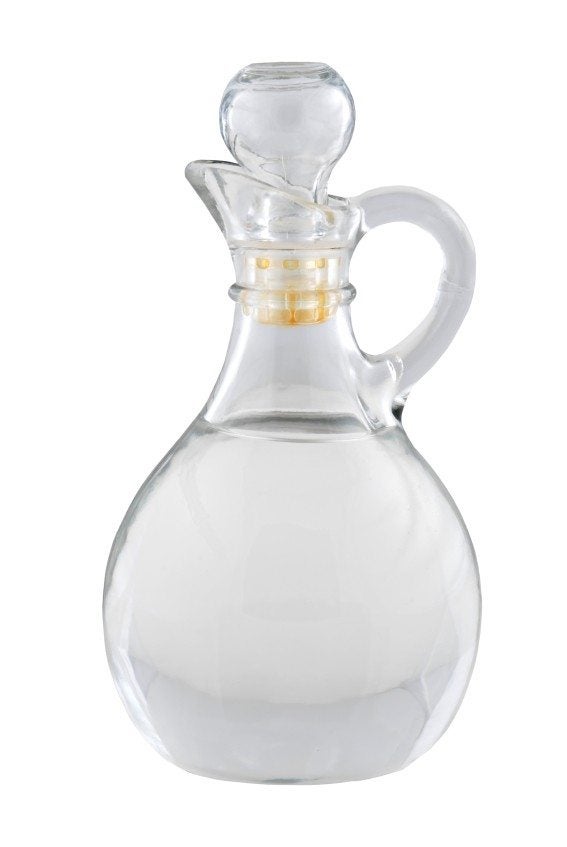Garden Uses For Vinegar - Tips For Using Vinegar In Gardens

Many of us have heard about the benefits of using vinegar in gardens, mainly as an herbicide. But how effective is vinegar and what else can it be used for? Let's find out more about how to use vinegar in the garden.
Using Vinegar in Gardens
It has been said that one of the benefits of vinegar in the garden is as a fertilizing agent. Nope. Acetic acid only contains carbon hydrogen and oxygen -- stuff the plant can get from the air. Vinegar has been recommended for use to up the pH levels in your soil. Apparently not so.
The effects are temporary and require large amounts of vinegar in the garden before anything noteworthy occurs. The last, but most commonly suggested use for vinegar in the garden is as an herbicide.
Household white vinegar, at its 5 percent acetic acid level, does indeed burn the tops of the weed. It does not, however, have any effect on the roots of the weed and will toast the foliage of any other plants it comes in contact with.
Vinegar as Herbicide
Woo hoo! Vinegar as herbicide: a safe, easily found (often in the kitchen cabinet) and inexpensive product to use in the control of weeds. The use of vinegar in the garden to retard weed growth has long been recommended by your neighbor, your neighbor's grandmother, and your own mother, but does it work? Vinegar contains acetic acid (about 5 percent), which as the nomenclature suggests, burns upon contact.
Actually, for any of you who have inhaled a whiff of vinegar, it also affects the mucus membranes and causes a swift reaction. Due to its burning effects, using vinegar in the garden has been touted as a cure-all for a number of garden afflictions, most notably weed control.
The acetic acid of vinegar dissolves the cell membranes resulting in desiccation of tissues and death of the plant. While this sounds like a splendid outcome for the plague of weeds invading your yard, I suspect you wouldn't be quite as thrilled if vinegar as herbicide were to damage your perennials or garden veggies.
Sign up for the Gardening Know How newsletter today and receive a free copy of our e-book "How to Grow Delicious Tomatoes".
A higher acetic acid (20 percent) product can be purchased, but this has the same potentially damaging results as utilizing vinegar as a herbicide. At these higher concentrations of acetic acid, some weed control has been shown to be established (80 to 100 percent of smaller weeds), but be sure to follow the manufacturer's instructions.
Also, be aware of its caustic effects on your nasal passages, eyes, and skin, not to mention garden plants, and take the appropriate precautions. Despite the longstanding proponents for using vinegar in gardens, little beneficial information has been proven.
It seems that research conducted by the USDA with solutions containing 5 percent vinegar has not been shown to be reliable weed control. Higher concentrations of this acid (10 to 20 percent) found in retail products may retard the growth of some annual weeds and will indeed kill the foliage of perennial weeds such as Canada thistle, but without killing the roots; thereby, resulting in regeneration.
In summary, vinegar used as herbicide may be slightly effective on small annual weeds during the lawn's dormancy and prior to garden planting, but as long-term weed control, it's probably better to stick with the old standby—hand pulling or digging.
Additional Garden Uses for Vinegar
Don't be alarmed if the benefits of vinegar aren't what you thought they would be. There are other garden uses for vinegar that can be just as good, if not better. Using vinegar in gardens goes far beyond weed control. Here are more options for how to use vinegar in the garden:
- Freshen up cut flowers. Add 2 tablespoons (30 mL.) vinegar and 1 teaspoon (5 mL.) sugar for each quart of water.
- Deter ants by spraying vinegar around door and window frames, and along other known ant trails.
- Eliminate calcium buildup on brick or on limestone with half vinegar and half water. Spray on and then just let it set.
- Clean rust from garden tools and spigots by soaking in undiluted vinegar overnight.
- And finally, don't forget the animals. For instance, you can remove skunk odor from a dog by rubbing down the fur with full-strength vinegar and then rinsing clean. Keep cats away from garden or play areas (especially sandboxes). Just sprinkle vinegar in these areas. Cats hate the smell.

Amy Grant has been gardening for 30 years and writing for 15. A professional chef and caterer, Amy's area of expertise is culinary gardening.
